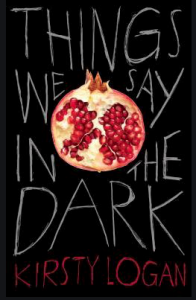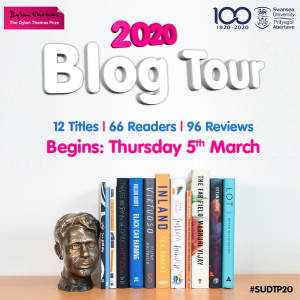
A few years ago, I read one of Kirsty Logan’s short stories and liked it very much. Since then, I wanted to read her again and when I saw her latest book on the Dylan Prize Longlist and was offered to read it, I didn’t hesitate.
Short story collections come in different forms. There are anthologies, best of or themed collections that contain mostly commissioned stories. When it comes to collections of single authors, they are just as diverse. Some authors write predominantly novels and novellas, but short stories here and there and, after a while, they are put together in a collection. Even those who write mostly or only short stories, will just collect a certain number of stories that have been published over the years. Cohesive, structured collections that form a whole and have been written with the whole book in mind, are far less frequent. Things We Say in the Dark belongs to the latter category. This is a highly conceptual collection. You could read individual stories, but reading them in this specific order and with all the bits and pieces that form this collection, makes this a rather unique experience.
The book is divided into three parts. There’s a quote at the beginning of every part that sets the tone. There’s also a dark drawing at the beginning, which also contributes to the tone. And there are the titles. Every one of the stories has a very long title. Here are a few examples
Things My Wife And I Found Hidden in Our House
The World’s More Full of Weeping Than You Can Understand
The Only Time I Think of You is All the Time
The first story of each part has sections called Fear 1, Fear 2, Fear 3 . . .
Between the stories you find page-long texts in italics that lead the reader to believe, the author is writing about the writing process. After a while though, it becomes obvious that this too, is a short story.
The stories themselves are mostly surreal and always with an element of horror. Sometimes the horror is leaning towards the uncanny, sometimes it’s more frightening, but it always leaves the reader with a sense of unease. The reality described in this collection is porous. It’s never clear whether the characters are dreaming or whether they are hallucinating. In some stories it’s not even clear whether the characters aren’t the only ones who see the world as it is. Dreams and nightmares are carried over into the day. Fears manifest.
The themes are varied but always contain similar elements. Ghosts want revenge, babies are born but somehow still dead. Women are attacked, raped, seduced against their will. Women are mudered. Houses are empty but seem to have a life of their own.
These are dark stories. And that made it difficult for me to read as it just went from horror to horror. It’s a claustrophobic, nightmarish world, mostly populated by lonely figures.
Nonetheless, there were many stories that I liked a great deal.
Things My Wife And I Found Hidden in Our House and The Only Time I Think of You is All the Time are two of the best. They are both mysterious ghost stories. The reader doesn’t know what’s going on until the very end and the final twists are very eerie.
I would lie if I said, I “liked” this collection, but I’m very grateful I read it because it’s fascinating. It made me think a lot about the way short story collections are produced. The way all the elements played together in this collection was marvelous and very artful.
Kirsty Logan has been compared to Angela Carter, Margaret Atwood, and some others. I don’t agree with the comparison to Angela Carter as that would be reducing Carter to her themes and inspirations. Angela Carter’s language is one of the most sophisticated I know. Her vocabulary is huge. Kirsty Logan’s writing is much simpler. Carter’s world is far more colourful. If I had to compare Kirsty Logan, I’d rather compare her to Japanese author Yoko Ogawa, or the Austrian writer Alois Hotschnig. But maybe her first collection was very different.
Thanks go to Midas PR for a free copy of the book.
The Swansea University International Dylan Thomas Prize recognizes the best published work in the English language written by an author aged 39 or under. All literary genres are eligible, so there are poetry collections nominated as well as novels and short stories. The other 11 books on this year’s longlist are:
- Surge, Jay Bernard
- Flèche, Mary Jean Chan
- Exquisite Cadavers, Meena Kandasamy
- Black Car Burning, Helen Mort
- Virtuoso, Yelena Moskovich
- Inland, Téa Obreht
- Stubborn Archivist, Yara Rodrigues Fowler
- If All the World and Love Were Young, Stephen Sexton
- The Far Field, Madhuri Vijay
- On Earth We’re Briefly Gorgeous, Ocean Vuong
- Lot, Bryan Washington

